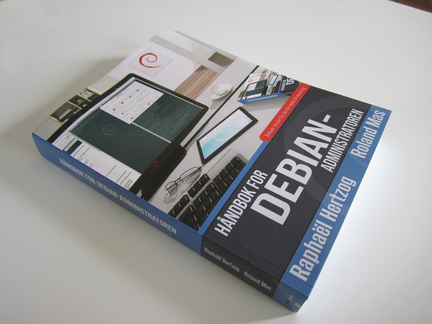Over the years, administrating thousand of NFS mounting linux
-computers at the time, I often needed a way to detect if the machine
-was experiencing NFS hang. If you try to use df or look at a
-file or directory affected by the hang, the process (and possibly the
-shell) will hang too. So you want to be able to detect this without
-risking the detection process getting stuck too. It has not been
-obvious how to do this. When the hang has lasted a while, it is
-possible to find messages like these in dmesg:
-
-
-nfs: server nfsserver not responding, still trying
-
nfs: server nfsserver OK
-
-
-
It is hard to know if the hang is still going on, and it is hard to
-be sure looking in dmesg is going to work. If there are lots of other
-messages in dmesg the lines might have rotated out of site before they
-are noticed.
-
-
While reading through the nfs client implementation in linux kernel
-code, I came across some statistics that seem to give a way to detect
-it. The om_timeouts sunrpc value in the kernel will increase every
-time the above log entry is inserted into dmesg. And after digging a
-bit further, I discovered that this value show up in
-/proc/self/mountstats on Linux.
-
-
The mountstats content seem to be shared between files using the
-same file system context, so it is enough to check one of the
-mountstats files to get the state of the mount point for the machine.
-I assume this will not show lazy umounted NFS points, nor NFS mount
-points in a different process context (ie with a different filesystem
-view), but that does not worry me.
-
-
The content for a NFS mount point look similar to this:
-
-
-[...]
-device /dev/mapper/Debian-var mounted on /var with fstype ext3
-device nfsserver:/mnt/nfsserver/home0 mounted on /mnt/nfsserver/home0 with fstype nfs statvers=1.1
- opts: rw,vers=3,rsize=65536,wsize=65536,namlen=255,acregmin=3,acregmax=60,acdirmin=30,acdirmax=60,soft,nolock,proto=tcp,timeo=600,retrans=2,sec=sys,mountaddr=129.240.3.145,mountvers=3,mountport=4048,mountproto=udp,local_lock=all
- age: 7863311
- caps: caps=0x3fe7,wtmult=4096,dtsize=8192,bsize=0,namlen=255
- sec: flavor=1,pseudoflavor=1
- events: 61063112 732346265 1028140 35486205 16220064 8162542 761447191 71714012 37189 3891185 45561809 110486139 4850138 420353 15449177 296502 52736725 13523379 0 52182 9016896 1231 0 0 0 0 0
- bytes: 166253035039 219519120027 0 0 40783504807 185466229638 11677877 45561809
- RPC iostats version: 1.0 p/v: 100003/3 (nfs)
- xprt: tcp 925 1 6810 0 0 111505412 111480497 109 2672418560317 0 248 53869103 22481820
- per-op statistics
- NULL: 0 0 0 0 0 0 0 0
- GETATTR: 61063106 61063108 0 9621383060 6839064400 453650 77291321 78926132
- SETATTR: 463469 463470 0 92005440 66739536 63787 603235 687943
- LOOKUP: 17021657 17021657 0 3354097764 4013442928 57216 35125459 35566511
- ACCESS: 14281703 14290009 5 2318400592 1713803640 1709282 4865144 7130140
- READLINK: 125 125 0 20472 18620 0 1112 1118
- READ: 4214236 4214237 0 715608524 41328653212 89884 22622768 22806693
- WRITE: 8479010 8494376 22 187695798568 1356087148 178264904 51506907 231671771
- CREATE: 171708 171708 0 38084748 46702272 873 1041833 1050398
- MKDIR: 3680 3680 0 773980 993920 26 23990 24245
- SYMLINK: 903 903 0 233428 245488 6 5865 5917
- MKNOD: 80 80 0 20148 21760 0 299 304
- REMOVE: 429921 429921 0 79796004 61908192 3313 2710416 2741636
- RMDIR: 3367 3367 0 645112 484848 22 5782 6002
- RENAME: 466201 466201 0 130026184 121212260 7075 5935207 5961288
- LINK: 289155 289155 0 72775556 67083960 2199 2565060 2585579
- READDIR: 2933237 2933237 0 516506204 13973833412 10385 3190199 3297917
- READDIRPLUS: 1652839 1652839 0 298640972 6895997744 84735 14307895 14448937
- FSSTAT: 6144 6144 0 1010516 1032192 51 9654 10022
- FSINFO: 2 2 0 232 328 0 1 1
- PATHCONF: 1 1 0 116 140 0 0 0
- COMMIT: 0 0 0 0 0 0 0 0
-
-device binfmt_misc mounted on /proc/sys/fs/binfmt_misc with fstype binfmt_misc
-[...]
-
-
-
The key number to look at is the third number in the per-op list.
-It is the number of NFS timeouts experiences per file system
-operation. Here 22 write timeouts and 5 access timeouts. If these
-numbers are increasing, I believe the machine is experiencing NFS
-hang. Unfortunately the timeout value do not start to increase right
-away. The NFS operations need to time out first, and this can take a
-while. The exact timeout value depend on the setup. For example the
-defaults for TCP and UDP mount points are quite different, and the
-timeout value is affected by the soft, hard, timeo and retrans NFS
-mount options.
-
-
The only way I have been able to get working on Debian and RedHat
-Enterprise Linux for getting the timeout count is to peek in /proc/.
-But according to
-Solaris
-10 System Administration Guide: Network Services, the 'nfsstat -c'
-command can be used to get these timeout values. But this do not work
-on Linux, as far as I can tell. I
-asked Debian about this,
-but have not seen any replies yet.
-
-
Is there a better way to figure out if a Linux NFS client is
-experiencing NFS hangs? Is there a way to detect which processes are
-affected? Is there a way to get the NFS mount going quickly once the
-network problem causing the NFS hang has been cleared? I would very
-much welcome some clues, as we regularly run into NFS hangs.
-
